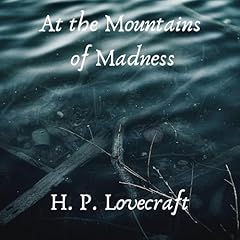![At the Mountains of Madness [Blackstone Edition] Audiolibro Por H. P. Lovecraft arte de portada](https://m.media-amazon.com/images/I/51gaDjmRQ5L._SL500_.jpg)
At the Mountains of Madness [Blackstone Edition]
No se pudo agregar al carrito
Add to Cart failed.
Error al Agregar a Lista de Deseos.
Error al eliminar de la lista de deseos.
Error al añadir a tu biblioteca
Error al seguir el podcast
Error al dejar de seguir el podcast
 Exclusivo para miembros Prime: ¿Nuevo en Audible? Obtén 2 audiolibros gratis con tu prueba.
Exclusivo para miembros Prime: ¿Nuevo en Audible? Obtén 2 audiolibros gratis con tu prueba.Compra ahora por $12.00
-
Narrado por:
-
Edward Herrmann
-
De:
-
H. P. Lovecraft
A master of terror and nightmarish visions, H.P. Lovecraft solidified his place at the top of the horror genre with this macabre supernatural tale.
When a geologist leads an expedition to the Antarctic plateau, his aim is to find rock and plant specimens from deep within the continent. The barren landscape offers no evidence of any life form - until they stumble upon the ruins of a lost civilization. Strange fossils of creatures unknown to man lead the team deeper, where they find carved stones dating back millions of years. But it is their discovery of the terrifying city of the Old Ones that leads them to an encounter with an untold menace.
Deliberately told and increasingly chilling, At the Mountains of Madness is a must-have for every fan of classic terror.
Public Domain (P)2013 Blackstone Audio, Inc.Los oyentes también disfrutaron:




















Featured Article: The top 100 horror books of all time
This list encompasses the full spectrum of what horror can be—campfire-worthy tales, stomach-churning gore, and incisive social commentary. The classics are accounted for, but it also spotlights more recent titles, because that’s the nature of the genre—it is as perennial as it is ever-evolving, conjuring whatever frights most haunt our collective consciousness. Each title does have one thing in common: It makes for devilishly good listening. So cut the lights and press play—if you dare.
Las personas que vieron esto también vieron:


















What made the experience of listening to At the Mountains of Madness [Blackstone Edition] the most enjoyable?
I especially enjoyed Lovecrafts use of the English language, and Mr.Herrman's outstanding read.What other book might you compare At the Mountains of Madness [Blackstone Edition] to and why?
Like many Poe stories.Peter Straub.
Which character – as performed by Edward Herrmann – was your favorite?
The narratorWho was the most memorable character of At the Mountains of Madness [Blackstone Edition] and why?
The narrator. He was an eyewitness to something he hoped no humans would ever see again..while he was reporting events objectively, he was also trying to convey a dire warning.Any additional comments?
Worth it.Well Read, Good Tale
Se ha producido un error. Vuelve a intentarlo dentro de unos minutos.
Excellent book, too short.
Se ha producido un error. Vuelve a intentarlo dentro de unos minutos.
Turns out, it WAS something I liked!
For some reason, I was expecting a lot of gore and outright horror. I think I was also expecting some supernatural elements -- demons and the like. Instead, this book reminded me far more of some great sci-fi classics like Clarke's Rendezvous With Rama, Verne's Journey to the Center of the Earth, and Conan Doyle's The Lost World. I absolutely loved it, and can't wait for the movie now. I plan to get some other stuff by Lovecraft now that I have a better idea what he's about.
Excellent! Not the gory bloodbath I expected!
Se ha producido un error. Vuelve a intentarlo dentro de unos minutos.
Fascinating and tense
Se ha producido un error. Vuelve a intentarlo dentro de unos minutos.
incredible writing
Se ha producido un error. Vuelve a intentarlo dentro de unos minutos.



